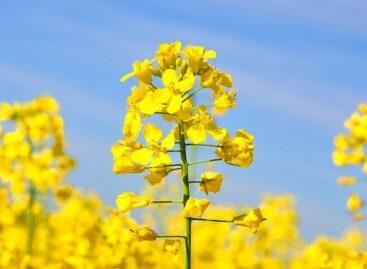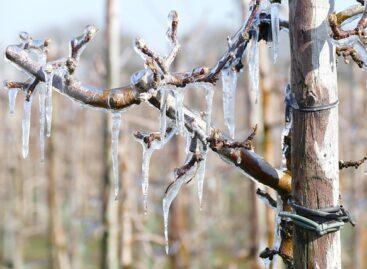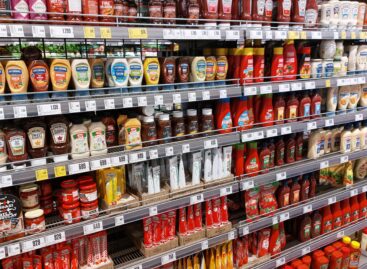NAK President: This year holds challenges for agriculture
The year 2025 holds many challenges for Hungarian agriculture: in addition to adapting to climate change and the transformation of the European Union support system, free trade agreements and the associated loss of markets could also have a serious impact on the sector – said Zsolt Papp, President of the National Chamber of Agriculture (NAK), at a professional briefing in Budapest on Thursday.

At the joint briefing of NAK and Magosz, Zsolt Papp emphasized that a significant drought is to be expected, and one of the biggest tasks this year will be how to improve Hungary’s water retention capabilities, increase its water resources and use them more efficiently. He reminded that three ministries have established a joint working group, which has also prepared legislative amendments, and the Water to the Landscape program is part of this, for which about 600 farmers have offered land. He said that a structural change may be needed in agriculture and that joint answers must be found on how to increase farmers’ resilience in times of environmental challenges.
Another major challenge facing the agricultural sector is maintaining markets
While Hungarian producers and food manufacturers are subject to strict regulations, imported products from third countries do not have to comply with similar rules, which is true for livestock breeders, plant growers and food manufacturers as well. With the Mercosur free trade agreement between the EU and the South American states, GMO products can also enter the European markets, he added. Ukraine can conquer the European and Hungarian markets with cheap mass products produced through its lower production costs, while Hungarian farmers may also lose part of their subsidies in the event of Ukraine’s accession to the EU, he warned. Speaking about the EU subsidies available to Hungarian farmers, he said: agriculture is in an unprecedentedly active period, with 40 out of 73 calls for proposals under the Common Agricultural Policy (CAP) for the period 2023-2027. Hungarian agriculture can only remain competitive if it can produce marketable products, and consumers also support high-quality food produced domestically under controlled conditions through their conscious choices – he emphasized. He said: NAK will launch a comprehensive promotional campaign in the summer to promote Hungarian products, pork, meat and vegetable products, the aim of the campaign is to make Hungarian consumers aware of the need to look for high-quality Hungarian products. The frosts in April and May caused significant damage to fruit producers, the submission and evaluation of applications are still ongoing, so they will only be able to provide accurate data later – he said.
Zsolt Papp touched on the importance of training, the use of technological innovations and precision tools
Regarding the generational change, he noted that the average age in agriculture is currently 58 years, and the proportion of people under 35 is barely 5 percent, which is already considered a “margin of error” category. István Jakab, president of the Association of Hungarian Farmers’ Associations and Cooperatives (MAGOSZ), said that the European Commission is currently engaged in “stealth strategy creation”, in which the transformation of the EU budget, the future of the Common Agricultural Policy (CAP) and the accelerated accession of Ukraine are all on the agenda. Ukraine’s integration could mean an expenditure of around 86 billion euros, while the value of the subsidies provided so far has already reached 140 billion euros. The creation of a possible “large fund” could take resources away from farmers in the current member states, so they would not receive a single cent of direct support in the future. Ukraine still uses several pesticides that have been banned in the EU for decades, and the 500,000 hectares of agricultural land awaiting demining in war zones pose a significant risk of contamination, for which no EU-level food safety assessment has been carried out so far, he said. Responding to a question, he said: there are only estimates for now, but the foot-and-mouth disease epidemic has caused tens of billions of forints in damage so far. András Cseh Tibor, Secretary General of Magosz and Vice President of the National Chamber of Agriculture, said that due to the campaign of certain lobby groups, the European agricultural sector is being presented as one of the main culprits for climate change, while the sector is responsible for 15 percent of global carbon dioxide emissions. The demand for animal protein products – dairy and meat products – and sugar is expected to continue to grow globally, while the European Union’s agricultural policy is preparing to reduce production and cut the Common Agricultural Policy (CAP) budget after 2028. By reducing support, farmers may lose their competitiveness and be at a disadvantage compared to third-country producers in their own markets, he underlined. The European Commission is expected to publish its draft budget for the next cycle in mid-June, along with the financial framework for the CAP after 2028, and will also decide on the tariff exemption for Ukrainian agricultural products, which expires at the beginning of June. The aim of last week’s farmers’ protests in Brussels was to draw the attention of decision-makers to the dangers before the decisions are made, he stressed.
MTI
Related news
Rapeseed prices fell worldwide and domestically
🎧 Hallgasd a cikket: Lejátszás Szünet Folytatás Leállítás Nyelv: Auto…
Read more >Related news
NGM-VOSZ cooperation agreement for digital commerce security
🎧 Hallgasd a cikket: Lejátszás Szünet Folytatás Leállítás Nyelv: Auto…
Read more >








